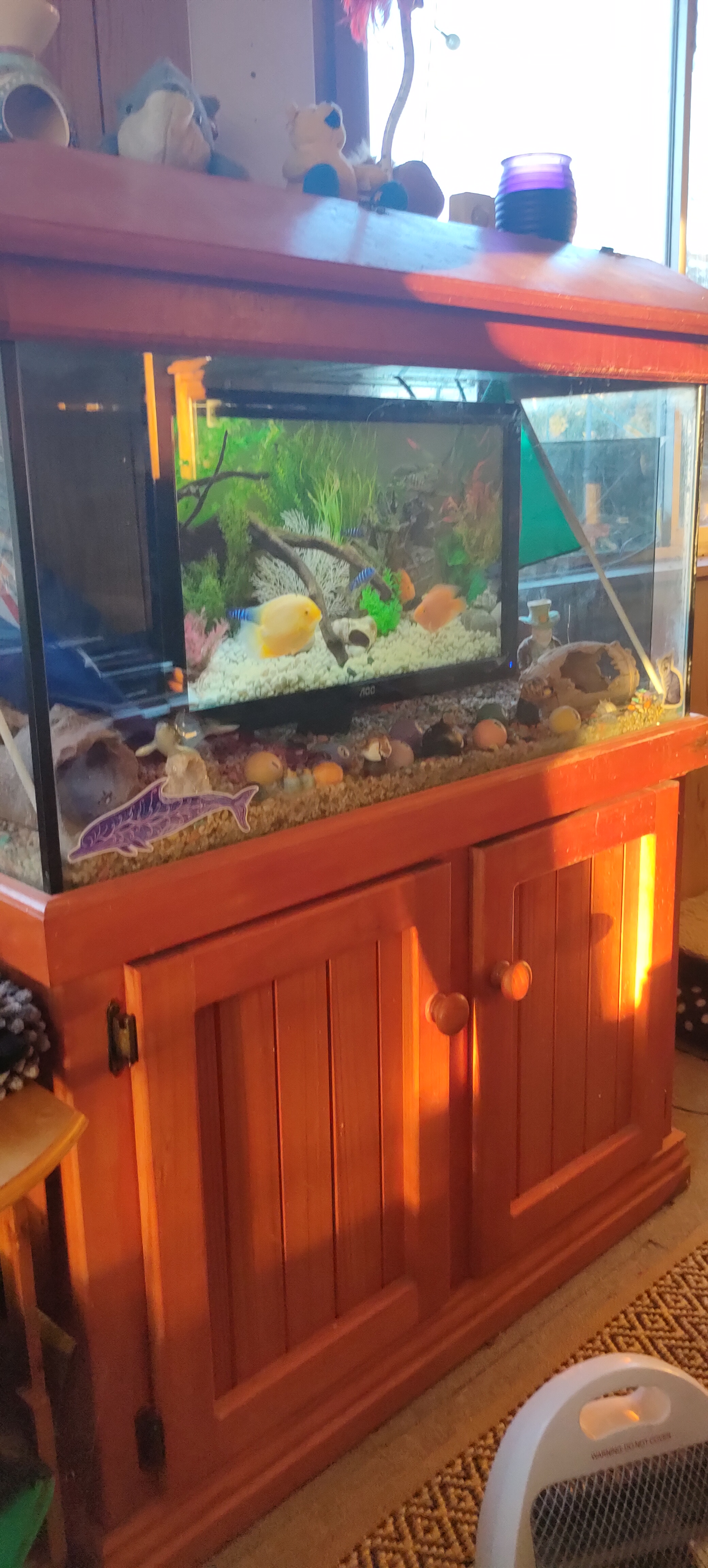Yeah, using a 9 year old work laptop as my home server. Then with the surging energy prices last year I decided to switch out that laptop with a raspberry pi 4 as server.
Conclusion: I now have a laptop and a RPI running 24/7 🤦♂️
Conclusion: I now have a laptop and a RPI running 24/7 🤦♂️
Sounds like a win to me. lol
My RPi4s and 3s will out perform my older laptops, apart from the just retired P50 (gpu nearly died). That one is 6y, the others are 11y old HPs and a 16y 32 bit Xxodd (wierd brand). tje RPis are sufficient for normal server use, the nwew laptop (last gen i9 with 64G mem) can host (nested) kvm clients, so no need for extra hardware. (And still I save them, just in case ;) )
I wouldn’t recommend a RPi for a server for anyone looking into this. Something like a ThinkCentre M92P will cost less and run circles around a RPi4, at not much more power. It will also support x86 and has Quick Sync tech which makes is great if you use something like jellyfin and need to do transcoding.
Even if you really need a low power SBC then a RPi4 was never the best option. The RockPro64 was released an entire year prior to the RPi4, and has a faster CPU. It supports booting from eMMC, and could boot from USB for like 2 years before the RPi figured it out. It also has a standard PCIe slot for adding SATA cards or extra ethernet ports instead of using the weird hat thing.
Personally though, I don’t think the tiny/mini/micro PCs can be beat, I run two of them at home for all my services.
I’m glad I don’t need computing power then. It just runs a webserver, 2 databases, mail environment, puppet master, icr client and some random stuff I just start and forget.
It does the trick here and it and it’s predecessor Rpi3 and 2 managed, are quiet and enough for here. Both 3s boot from microsd and run from USB SSD for the OS, data is on nas. All are stock, no extentions, apart from an extra USB nic on my firewall. (Somehow having 2 different physical interfaces sounded preferable to me for a firewall)
The old 3s are now interface for my smart meter and a domoticz system.
BTW I see the Thinkcenter you mention for €250 online, My RPi4 cost me as kit €108 (8GB version). That was before all prizes went trough the roof though, as I see the separate board now for €125.
BTW I see the Thinkcenter you mention for €250 online, My RPi4 cost me as kit €108 (8GB version). That was before all prizes went trough the roof though, as I see the separate board now for €125.
They can be had for < €100 on eBay, like even down to €50-70 sometimes. I’m not saying you shouldn’t use a RPi if you already have them, but RPi has not been worth it going back to the RPi3. If anyone needs to get hardware to setup their server, the tiny/mini/micro lines are better.
https://www.servethehome.com/introducing-project-tinyminimicro-home-lab-revolution/
I was put off of RPis since the RPi3 too, the way they misled people with their marketing about it having a gigabit port which was on a shared bus so it was not really true put me off of them. And Pine64 boards have been better with the RockPro over the RPi3, and the RockPro64 way better than the RPi4.
€
undefined> I was put off of RPis since the RPi3 too, the way they misled people with their marketing about it having a gigabit port which was on a shared bus so it was not really true put me off of them.
Yeah, that was the main drawback of the 3, the 1 GB port that was linked to the USB hub, which couldn’t do more then 480 Mbps, in total, shared over all USB devices. At least it did a GB handshake and managed more then 100 Mbps. ;)
The 4 However, has a separate chip for the on-board GB interface and I manage over 900 Mbps with it. When you use one as firewall and want to use 2 separate interfaces, you still have to use an USB interface, which here results in 300 Mbps trough both interfaces (after kicking the internal interface irq handling from cpu0). I’m probably one of the few so crazy to use an RPi that way. I came from 50 Mbps line, so anything faster is ok by me. (especially for the same monthly fee ;) )
I turned my ten year old Toshiba i7 with a cracked LCD into a virtual fish tank after the last fish died.

ATBGE!
I salute your creativity haha
Cool. A friend had one in a fireplace that played a fire video in the evenings - with the crackling sounds too.
i disaseemble all my laptops so they are just a motherboard, screw them into sheets of MDF, place vertically, and use them as servers.
NAS, pihole, plex, etc
You have a tutorial? That sounds awesome.
This article talks about turning a laptop into a rack mounted computer. Each computer will be different recreating something like this based off what ports it has and where.
Do you have any photos of this?
Would love to see how this looks in practice!Up! Also would love to see how it looks
Ummm… I need to know more. Photos? This sounds interesting!
Do you do a headless install like Ubuntu Server Preseed?
https://help.ubuntu.com/community/Cobbler/Preseed
Or do you install linux on an SSD from a different machine, then plug it into MDF mounted laptop mobo?
I would guess by plugging external peripherals to the motherboard.
I’m talking about the LCD/monitor. Maybe @penguin_knight keeps the LCD and mounts it to the board as well. If not, it’s headless. Mouse and keyboard are not the issue. I always set up raspberry pi headless because the OS allows it. All you have to do is add an
sshfile to the/bootdir andwpa_supplicant.conffile in root dir. Other distros typically don’t, they need a monitor to be installed.I know, that’s why I wrote external peripherals and not external inputs. I don’t want to sound cocky or be an asshole (we all know how easy it is by just reading a message someone you don’t know wrote), but after 24 years of being in system administration/engineering/architecture I may have sufficient grasp of what I am talking about. 😅
I’m patiently waiting for someone (anyone) I know to decide to throw out an old laptop.
Gonna bite their hand off for it, install Linux and proceed to fuck around and find out.
When you do, take a look at howtoforge.com.
Then throw on a bunch of containers from [linuxserver.io]https://www.linuxserver.io/)
Quick & easy for testing & learning.
My laptop for home use is almost 15 years old. My desktop is almost 11 years old. My work laptop is 8 years old. Here they are talking about more modern and powerful equipment, defining them as obsolete. I don’t know, maybe we should start questioning if these consumption dynamics are a bit harmful.
based and sustainability-pilled
I can even run the latest Stable diffusion models on my 8 year old GPU.
Old laptops can are actually great servers—hear me out:
- Built in KVM
- Low power consumption
- Battery = UPS for power blips
- SSD (sometimes)
- Wifi + Ethernet = Redundant NICs
- Quiet (sometimes)
- Small form factor
The battery is usually long gone by the time it becomes a server though.
Really old laptops have PCMCIA slots too that you can hook into newer interfaces. I used a PCMCIA eSATA card for a laptop NAS!
The battery is usually long gone by the time it becomes a server though.
Absolutely. I still have my laptop from high school, and it’s battery has been long gone. The screen is on its last legs.
Maybe it will be a server one day, but for now it’s my DnD laptop. Sucks a bit when somebody bumps the power cord and the battlemap turns off. But it’s still limping by.
My (very) old Vaio from 2013 just had a disk change with an SSD and is now a fantastic domain controller.
I’m actually hosting things on my 2 year old gaming pc (which is no longer used for gaming) and using my 8 year old laptop daily… How the turn tables.
For years I had an Asus EEE PC as my home NAS.
Oh no! It’s the EEE PC!
I used to use my 10 year old old netbook (intel atom n270 2gb ram - ubuntu server) as a server for Plex, calibre, pihole, ssftp.
Now I am using a Raspberry Pi 4 8GB Ram, as it consumes less electricity. Old laptops are consuming (except HDDs/SSDs) 10-30 watt. Raspberry Pi in indle consumes 2watt and when i am using it at mac power with an external hdd consumes 12watt.
I thought about it, but the additional display, made me think about power saving, how to shut off screen, while keeping the headless service loaded? … premature optimization?
In Linux it is possible to turn the screen off after a timeout and keep the system on with the lid closed.
Exactly, and what other OS to use for old device turned server than Linux?
You can use windows 7 or windows AME but not sure it’s a good idea tho. What’s wrong with using Linux?
I meant it as rhetorical question with obvious answer.
yep!
I used to run an old Dell R610. Used a decent amount of power.
Switched to an old 4th gen quadcore i7 laptop.
Been running great, uses less power, has a built in display and keyboard.
Linux base, Docker Env for most everything else.
And a built in ups if your battery is still good
Wait you can do that??? I have one right now!!!
Shoutout to my 16 year old dell laptop running god knows what for all eternity
The big issue with laptops tends to be cooling, but something with a decent CPU and enough RAM can still do a good job since in many cases you’re not tapping the graphics chip/core, which is often the biggest source of heat.
That said, for small personal services even an 8GB Pi4 can do a pretty decent job.













